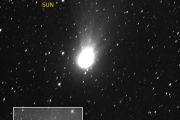
Copernical Team
Neuraspace launches autonomous defence platform to protect European space assets
 Neuraspace, one of Europe's leading space domain awareness (SDA) providers, has expanded its role in defence and civil protection with the launch of "Neuraspace DEF," a system designed to deliver autonomous, rapid responses to threats against space-based infrastructure.
The new platform advances beyond traditional passive monitoring by enabling active and self-directed control of space ope
Neuraspace, one of Europe's leading space domain awareness (SDA) providers, has expanded its role in defence and civil protection with the launch of "Neuraspace DEF," a system designed to deliver autonomous, rapid responses to threats against space-based infrastructure.
The new platform advances beyond traditional passive monitoring by enabling active and self-directed control of space ope Ariane 6 set to deploy Copernicus Sentinel 1D on November 4
 On November 4, 2025 at 6:03 p.m. local time in French Guiana (9:03 p.m. UTC, 10:03 p.m. CET), Arianespace plans to launch the Copernicus Sentinel-1D satellite aboard Ariane 6 from Europe's Spaceport. Mission VA265 marks the launcher's third commercial flight and will target Sun-synchronous orbit near 693 km.
Separation is expected about 34 minutes after liftoff. The mission underscores Eur
On November 4, 2025 at 6:03 p.m. local time in French Guiana (9:03 p.m. UTC, 10:03 p.m. CET), Arianespace plans to launch the Copernicus Sentinel-1D satellite aboard Ariane 6 from Europe's Spaceport. Mission VA265 marks the launcher's third commercial flight and will target Sun-synchronous orbit near 693 km.
Separation is expected about 34 minutes after liftoff. The mission underscores Eur Digital revolution brings new clarity to direct exoplanet imaging with PLACID's liquid crystal optics
 A groundbreaking instrument is set to transform how astronomers detect and directly image planets orbiting distant stars by using liquid crystal technology. Known as the Programmable Liquid-crystal Active Coronagraphic Imager for the DAG telescope (PLACID), the device was installed earlier this year on the new 4-meter Eastern Anatolian Observatory (DAG) telescope in eastern Turkey. Now entering
A groundbreaking instrument is set to transform how astronomers detect and directly image planets orbiting distant stars by using liquid crystal technology. Known as the Programmable Liquid-crystal Active Coronagraphic Imager for the DAG telescope (PLACID), the device was installed earlier this year on the new 4-meter Eastern Anatolian Observatory (DAG) telescope in eastern Turkey. Now entering How rotating black holes unleash cosmic particle jets
 At the center of the massive galaxy M87 lies the supermassive black hole M87*, weighing six and a half billion times the mass of the Sun and spinning rapidly on its axis. From this powerhouse, an enormous jet of charged particles blasts outward at nearly the speed of light, extending over 5,000 light-years and reshaping its galactic environment.
To understand how such jets are powered, ast
At the center of the massive galaxy M87 lies the supermassive black hole M87*, weighing six and a half billion times the mass of the Sun and spinning rapidly on its axis. From this powerhouse, an enormous jet of charged particles blasts outward at nearly the speed of light, extending over 5,000 light-years and reshaping its galactic environment.
To understand how such jets are powered, ast Gaia data uncovers hidden link between asteroid collisions and chaotic spin states
 Whether an asteroid spins smoothly or tumbles chaotically depends on how often it has collided with other objects, according to new findings presented at the EPSC-DPS2025 Joint Meeting in Helsinki. Using data from the European Space Agency's Gaia mission, researchers have discovered that these collision patterns reveal clues about asteroids' internal structure and evolution.
Dr Wen-Han Zho
Whether an asteroid spins smoothly or tumbles chaotically depends on how often it has collided with other objects, according to new findings presented at the EPSC-DPS2025 Joint Meeting in Helsinki. Using data from the European Space Agency's Gaia mission, researchers have discovered that these collision patterns reveal clues about asteroids' internal structure and evolution.
Dr Wen-Han Zho Chinese astronauts complete fourth spacewalk of Shenzhou XX mission
 Crew members aboard the Shenzhou XX spacecraft carried out their fourth extravehicular activity, completing critical tasks outside the Tiangong space station, the China Manned Space Agency reported.
Colonel Chen Zhongrui, 40, and Colonel Wang Jie, 36, floated in space for nearly six hours before returning to the Wentian science module at 1:35 am. Mission commander Senior Colonel Chen Dong
Crew members aboard the Shenzhou XX spacecraft carried out their fourth extravehicular activity, completing critical tasks outside the Tiangong space station, the China Manned Space Agency reported.
Colonel Chen Zhongrui, 40, and Colonel Wang Jie, 36, floated in space for nearly six hours before returning to the Wentian science module at 1:35 am. Mission commander Senior Colonel Chen Dong With new analysis, Apollo samples brought to Earth in 1972 reveal exotic sulfur hidden in Moon's mantle
 When astronauts returned from NASA's final Apollo Moon mission in 1972, some of the samples they collected were sealed and carefully stored away in the hope that future researchers using advanced equipment might analyze them and make new discoveries.
Now, a research team led by a Brown University professor has done just that. In a study published in JGR: Planets, researchers report a sulfu
When astronauts returned from NASA's final Apollo Moon mission in 1972, some of the samples they collected were sealed and carefully stored away in the hope that future researchers using advanced equipment might analyze them and make new discoveries.
Now, a research team led by a Brown University professor has done just that. In a study published in JGR: Planets, researchers report a sulfu We need a solar sail probe to detect space tornadoes earlier, more accurately
 Spirals of solar wind can spin off larger solar eruptions and disrupt Earth's magnetic field, yet they are too difficult to detect with our current single-location warning system, according to a new study from the University of Michigan.
But a constellation of spacecraft, including one that sails on sunlight, could help find the tornado-like features in time to protect equipment on Earth a
Spirals of solar wind can spin off larger solar eruptions and disrupt Earth's magnetic field, yet they are too difficult to detect with our current single-location warning system, according to a new study from the University of Michigan.
But a constellation of spacecraft, including one that sails on sunlight, could help find the tornado-like features in time to protect equipment on Earth a Sharper than ever: New algorithm brings the stars into greater focus
 Johns Hopkins applied mathematicians and astronomers have developed a new method to render images from ground-based telescopes as clear as those taken from space, a process that stands to expand the benefits of Earth-based instruments.
Using algorithms that can strip away atmospheric interference, the researchers have made it possible for Earth-bound telescopes to produce some of the deepe
Johns Hopkins applied mathematicians and astronomers have developed a new method to render images from ground-based telescopes as clear as those taken from space, a process that stands to expand the benefits of Earth-based instruments.
Using algorithms that can strip away atmospheric interference, the researchers have made it possible for Earth-bound telescopes to produce some of the deepe Shield or Spark? The U.S. Golden Dome and the New Missile Arms Race
 The launch of the US 'Golden Dome' missile defence initiative has already set in motion ripple effects across the globe. Rival nations are considering their own layered missile defence architectures, and experts warn this may trigger a new era of competitive missile development. What began as a domestic shield is now fuelling a missile defence arms race, with competitors racing to counter, repli
The launch of the US 'Golden Dome' missile defence initiative has already set in motion ripple effects across the globe. Rival nations are considering their own layered missile defence architectures, and experts warn this may trigger a new era of competitive missile development. What began as a domestic shield is now fuelling a missile defence arms race, with competitors racing to counter, repli 





























